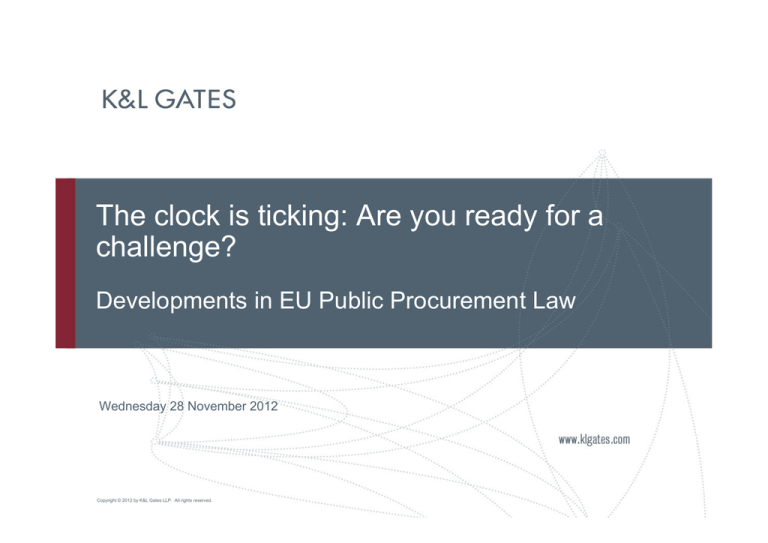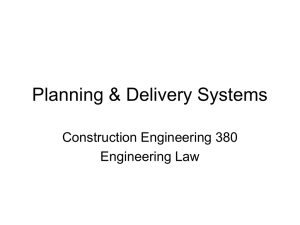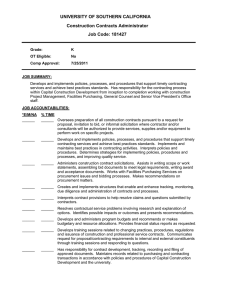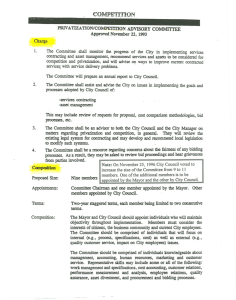
The clock is ticking: Are you ready for a
challenge?
Developments in EU Public Procurement Law
Wednesday 28 November 2012
Copyright © 2012 by K&L Gates LLP. All rights reserved.
Contract Ineffectiveness
Michael Bowsher QC - Monckton Chambers
Copyright © 2012 by K&L Gates LLP. All rights reserved.
Proposals for the Reform of
EU Directives on Public Procurement
Dr. Friedrich Ludwig Hausmann
Partner, K&L Gates Germany
Friedrich.hausmann@klgates.com
Copyright © 2012 by K&L Gates LLP. All rights reserved.
Scope of Proposals
The proposals by the EU Commission aim at an in-depth modernisation
of the current EU public procurement legislation
The proposals include:
Revision of Directive 2004/17/EC – COM/2011/0895 final – 2011/0439 (COD) *)
Revision of Directive 2004/18/EC – COM/2011/0896 final – 2011/0438 (COD) *)
New Directive on concessions – COM/2011/0897 final – 2011/0437 (COD) *)
All of these proposals have been and continue to be under negotiation *)
*) This presentation reflects the compromise text of the
Proposals published by the Council of the European Union
as of 19 October 2012
4
Objectives of Proposed Reform
Simpler and more flexible procedures
Increase access for SMEs to public contracts
Better governance and control that rules are properly applied in
practice
Stronger use of public procurement to achieve strategic political
objectives such as social or environmental innovation
5
Important Aspects of the Proposals
New procurement procedures – innovation partnership
Codification of case-law of the European Court of Justice
Conflicts of interest
Removal of the distinction between Part A and Part B services
New Directive on concessions
6
Innovation Partnership I
The innovation partnership intends to spur research and innovation as
the main drivers of future growth in Europe
The innovation partnership is a new procurement procedure to:
Establish a long-term innovation partnership between the contracting
authority and a private partner
Develop and subsequent purchase a new innovative product, service or
works
Innovation partnerships are proposed for the revised Directives
2004/18/EC and 2004/17/EC see proposed Art. 29 COM/2011/0896 and
Art. 43 COM/2011/0895
7
Innovation Partnership II - Applicability
The proposals do not provide specific guidelines in which cases
contracting authorities may apply an innovation partnership
According to the proposals an innovation partnership may be applied if
the contracting authority has a need to procure an innovative product,
service or work that does not exist on the market and thus requires
research and
a long-term partnership
for its development
8
Innovation Partnership III – Procedure
The proposals provide little guidance how the innovation partnership
shall be awarded
The proposals guidelines are limited to:
The innovation partnership contract shall be awarded in accordance with the
rules for a competitive procedure with negotiations
Two phases:
Selection of participants
Bidding phase
In selecting candidates, contracting authorities shall pay particular attention
to criteria concerning the candidates' capacity in the field of research and
development of innovative solutions
The contract shall be awarded on the sole basis of the award criterion of the
most economically advantageous tender
9
Innovation Partnership IV – Structure
The proposals allow the contracting authorities a high degree of
flexibility in structuring the Partnership
The Partnership shall be structured to provide:
for successive stages following the research process, possibly but not
necessarily up to the manufacturing of the supply or the provision of the
services
for intermediate targets to be attained by the partner and provide for
payments in appropriate instalments
The contracting authority shall indicate the regime applicable to
intellectual property rights
The contracting authority shall have the right to terminate the
partnership after each of the contractually agreed stages, provided that
the possibility and conditions for such termination have been indicated
in the procurement documents
10
Codification of case-law
Modifications of contracts during their terms
In-house transactions
11
Modifications of Contracts I – ECJ Case-Law
ECJ, judgment of 16.9.2008 – Case C – 454/06 “Pressetext”:
Amendments to the provisions of a public contract during the term of the
contract constitute a new award of a contract if they are material
An amendment may be regarded as being material when
It introduces conditions which, had they been part of the initial award
procedure, would have allowed for the admission of other tenderers or for
the acceptance of a tender other than the one initially accepted
it extends the scope of the contract considerably to encompass services
not initially covered
it changes the economic balance of the contract in favour of the contractor
in a manner which was not provided for in the terms of the initial contract
As a rule, the substitution of a new contractual partner for the one to which the
contracting authority had initially awarded the contract must be regarded
material
12
Modifications of Contracts II – EU Proposals
The commission codifies the ECJs rulings but adds some specifications
that provide for an increase in legal certainty (see Art. 72
COM/2011/0896; Art. 82 COM/2011/0895; Art 42 COM/2011/0897)
Those specifications are:
The substitution of the contractual partner is not material in the event of
universal or partial succession into the position of the initial contractor,
following corporate restructuring operations or insolvency, of another partner
fulfilling the initial quality criteria, provided this does not entail other material
changes or is aimed to circumvent the Directives
An amendment of the contract is not material if its value does not exceed the
thresholds set out in Art. 4 (COM/2011/0896) and is below 10% of the price of
the initial contract, provided that the overall nature of the contract is not
altered
No material change if modifications have been provided for in clear, precise
and unequivocal review clauses or options in the original contract
Special exemption in case modifications are necessary due to circumstances
unforeseeable for a diligent contracting authority
13
In-house Transactions I – ECJ Case-Law
Current case-law of the European Court of Justice
A public contract may be awarded to a person without a procurement
procedure if
contracting authority exercises control over the “person” in the same way as
over its own department; and
The “person” is “substantially” active for the contracting authority or other
legal persons controlled by the contracting authority (at least 80-90%)
ECJ, judgement of 18.11.1999 – Case C-107/98 “Teckal”; ECJ, judgement
of 11.1.2005 – Case C-26/03 “Stadt Halle”
14
In-house Transactions II – EU Proposals
No substantial changes to the current ECJ case-law, but an increase in legal
certainty (see Art. 11 COM/2011/0896; Art. 21 COM/2011/0895; Art 15
COM/2011/0897)
A contract awarded by a contracting authority to another legal entity shall fall
outside the scope of the Directives if:
The contracting authority exercises over the legal entity a control which is
similar to that which it exercises over its own departments; and
At least 85% of the activities of that legal entity are carried out for the
controlling contracting authority or for other legal entities controlled by that
contracting authority; and
There is no participation of private undertakings in the controlled legal entity
at the time of the award of the contract
From the moment any private participation takes place the ongoing contracts
need to be opened to competition through regular procurement procedures
15
In-house Transactions III – EU Proposals
A contracting authority exercises over a legal entity a control similar to
that which it exercises over its own departments if it exercises (alone or
jointly with another controlled legal entity) a decisive influence over both
strategic objectives and significant decisions of the controlled legal
entity
To determine the percentage of activities by the legal entity for the
contracting authority the average total turnover of the controlled legal
entity with respect to services, supplies and works for the three years
preceding the contract award shall be taken into consideration.
16
Conflicts of Interest I
The original proposals by the EU Commission to change Directives
2004/18/EC and 2004/17/EC included a new, specific conflicts of interest
rule (see Art. 21 COM/2011/0896; Art 36 COM/2011/0895). The proposal
defined in detail the situations and persons that may be affected by a
conflict of interest as well as the necessary remedies.
During the negotiations this specific conflicts of interest rule was
reduced to a general obligation that “Member States shall ensure that
contracting authorities take appropriate measures to effectively prevent,
identify and remedy conflicts of interests arising in the conduct of
procurement procedures so as to avoid any distortion of competition and
ensure equal treatment of all economic operators.”
17
Conflicts of Interest II
The only specific guideline in the Proposals is:
“The concept of conflicts of interest shall at least cover any situation where staff
members of the contracting authority or of a procurement service provider acting
on behalf of the contracting authority who are involved in the conduct of the
procurement procedure or may influence the outcome of that procedure have,
directly or indirectly, a financial, economic or other personal interest which might
be perceived to compromise their impartiality and independence in the context of
the procurement procedure.”
The proposal regarding a new Directive on concessions includes the
same general conflicts of interest rule (Art. 36 para. 4 COM/2011/0897)
18
Part A and B Services I
In the original Proposal of the EU Commission for a revised Directive
2004/18/EC the distinction between Part A and Part B services (Art. 20
of the Directive 2004/18/EC) was removed. The Commission explained:
“The results of the evaluation have shown that is no longer justified to restrict
the full application of procurement law to a limited group of services”
Nevertheless the Commission proposed a specific regime for social
services and other specific services listed in Annex XVI imposing only
the respect of basic principles of transparency and equal treatment
(see Art. 74 COM/2011/0896)
19
Part A and B Services II
The compromise text by the Council of the European Union as of 19 October
2012 expands the types of services in Annex XVI and provides in particular
that the Directive shall not apply to certain legal services
The revised Art. 10 of the Proposal COM/2011/0896 provides that the Directive
shall not apply for any of the following legal services:
(i) legal representation of a client in an arbitration or conciliation held in a Member
State or in judicial proceedings before the national courts, tribunals or public
authorities of a Member State by a lawyer within the meaning of Article 1 of
Directive 77/249/EEC;
(ia) legal representation of a client in an arbitration or conciliation held before an
international arbitration or conciliation instance or in judicial proceedings before the
international courts, tribunals or institutions by a lawyer within the meaning of
Article 1 of Directive 77/249/EEC;
(ii) document certification services which must be provided by notaries;
(iii) legal services provided by trustees, appointed guardians or other legal services the
providers of which are designated by a court or tribunal in the Member State
concerned;
(iv) other legal services which in the Member State concerned are connected, even
occasionally, with the exercise of official authority;
20
Part A and B Services III
ANNEX XVI – Services referred to in Art. 74
Commission Proposal as of 2011
Compromise Text as of 19 October 2012
Health and social services
Health, social and related services
Administrative educational, healthcare and
cultural services
Administrative social, educational, healthcare
and cultural services
Compulsory social security services
Compulsory social security services
Benefit services
Benefit services
Other community, social and personal services
Other community, social and personal services
including services furnished by trade unions, political
organisations, youth associations and other membership
organisation services
Services furnished by trade unions
Religious services
Religious services
Hotel and restaurant services
Legal services, if not excluded in Art. 10(ca)
Other administrative and government services
Provision of services to the community
Prison related, public security and rescue
services
Investigation and security services
International services
21
New Directive on Concessions I
Status quo:
Only works concessions are presently subject to limited rules and
regulations within the scope of Directive 2004/18/EC
Any other concessions are presently not subject to EU secondary law
provisions
Nevertheless the ECJ has ruled in an number of cases that contracting
authorities concluding public services concessions need to comply with the
fundamental rules of the EC Treaty – equal treatment, non-discrimination
and transparency – (ECJ, judgements of 7.12.2000 – C-324/98; of 21.7.2005 –
C-231/03; of 13.10.2005 – C458/03; of 13.11.2008 – C-324/07)
The current situation does not provide for the necessary legal certainty
The specific obligations and procedures a contracting authority has to
comply with when awarding a public service concession on the
grounds of the principles of equal treatment, non-discrimination and
transparency set out by ECJ case-law are unclear
22
New Directive on Concessions II
The main objectives of the proposal for a Directive on concessions are:
To close loopholes in the legal framework governing the procurement of
concessions
To provide the necessary legal certainty
The Directive shall apply to works and public services concessions the
value of which is equal or greater than 5.000.000 € (Art. 5
COM/2011/0897)
The Proposal is based on the existing public procurement Directives
but less comprehensive and detailed
In Germany there is strong opposition against any kind of regulation
regarding concessions. However, in the course of the negotiations in
2012 this fundamental opposition seems to have weakened
23
Innovation Partnership – Art. 29 COM/2011/0896
1. “In innovation partnerships, any economic operator may submit a request to
participate in response to a contract notice with a view to establishing a structured
partnership for the development of an innovative product, service or works and the
subsequent purchase of the resulting supplies, services or works, the need for which
cannot be met by solutions already available on the market, provided that they
correspond to the agreed performance levels and maximum costs. The contracting
authority may decide to set up the innovation partnership with one partner or with
several partners conducting separate research and development activities. The
contracts shall be awarded on the sole basis of the award criterion of the most
economically advantageous tender in accordance with Article 66(1)(a).
2. The innovation partnership shall be structured in successive stages following the
sequence of steps in the research and innovation process, which may include the
manufacturing of the supply, the provision of the services or the completion of the
works. The innovation partnership shall set intermediate targets to be attained by the
partners and provide for payment of the remuneration in appropriate instalments.
Based on those targets, the contracting authority may decide after each stage to
terminate the innovation partnership or, in the case of an innovation partnership with
several partners, to reduce the number of partners by terminating individual contracts,
provided that the contracting authority has indicated in the procurement documents
that and the conditions under which it may make use of these possibilities.
24
Innovation Partnership – Art. 29 COM/2011/0896
3.
Unless otherwise provided for in this Article, the contract shall be awarded in accordance
with the rules set out in the second sentence of the first subparagraph of Article 27(1), the
second subparagraph of Article 27(1) and Article 27(3), (3a), (3b), (4) and (5). In selecting
candidates, contracting authorities shall in particular apply criteria concerning the
candidates’ capacity in the field of research and development and of developing and
implementing innovative solutions. They may limit the number of candidates that they will
invite to participate in the procedure in accordance with Article 64. Only those economic
operators invited by the contracting authority following its assessment of the information
provided may submit research and innovation projects aimed at meeting the needs
identified by the contracting authority. In the procurement documents, the contracting
authority shall indicate the regime applicable to intellectual property rights. In the case of an
innovation partnership with several partners, the contracting authority shall not reveal to the
other partners solutions proposed or other confidential information communicated by a
partner in the framework of the partnership without its agreement. Such agreement shall not
take the form of a general waiver but shall be given with reference to the intended
communication of specific information.
4.
The contracting authority shall ensure that the structure of the partnership and, in particular,
the duration and value of the different phases reflect the degree of innovation of the
proposed solution and the sequence of the research and innovation activities required for
the development of an innovative solution not yet available on the market. The estimated
value of supplies, services or works purchased shall not be disproportionate in relation to
the investment for their development.”
25
Modifications of Contracts – Art. 72 COM/2011/0896
1.
“A substantial modification of the provisions of a public contract or a framework agreement
during its term shall be considered as a new award for the purposes of this Directive and
shall require a new procurement procedure in accordance with this Directive. In the cases
referred to in paragraphs 3, 4 or 5, modifications shall not be considered as substantial.
2.
A modification of a contract or a framework agreement during its term shall be considered
substantial within the meaning of paragraph 1, where it renders the contract or the framework
agreement materially different in character from the one initially concluded. In any case,
without prejudice to paragraphs 3, 4 or 5, a modification shall be considered substantial
where one of the following conditions is met:
a)
the modification introduces conditions which, had they been part of the initial
procurement procedure, would have allowed for the admission of other candidates than
those initially selected or for the acceptance of an offer other than that originally
accepted or would have attracted additional participants in the procurement procedure;
b)
the modification changes the economic balance of the contract or the framework
agreement in favour of the contractor in a manner which was not provided for in the
initial contract or framework agreement;
c)
the modification extends the scope of the contract or framework agreement considerably
[…]
26
Modifications of Contracts – Art. 72 COM/2011/0896
3.
Modifications shall not be considered substantial within the meaning of paragraph 1
where they have been provided for in the initial procurement documents in clear,
precise and unequivocal review clauses or options. Such clauses shall state the scope
and nature of possible modifications or options as well as the conditions under which
they may be used. They shall not provide for modifications or options that would alter
the overall nature of the contract or the framework agreement.
4.
Where the value of a modification can be expressed in monetary terms, the
modification shall not be considered to be substantial within the meaning of paragraph
1, where its value does not exceed the thresholds set out in Article 4 and where it is
below 10% of the initial contract value, provided that the modification does not alter the
overall nature of the contract or framework agreement. Where several successive
modifications are made, the value shall be assessed on the basis of the net cumulative
value of the successive modifications.
27
Modifications of Contracts – Art. 72 COM/2011/0896
5.
A modification shall not be considered to be substantial within the meaning of paragraph 1,
where the following cumulative conditions are fulfilled:
a)
the need for modification has been brought about by circumstances which a diligent
contracting authority could not foresee;
b)
the modification does not alter the overall nature of the contract;
c)
any increase in price is not higher than 50 % of the value of the original contract or
framework agreement.
Contracting authorities shall publish in the Official Journal of the European Union a notice on
such modifications. Such notices shall contain the information set out in Annex VI part G and
be published in accordance with Article 49.
6.
Without prejudice to paragraph 3, the substitution of a new contractor for the one to which
the contracting authority had initially awarded the contract shall be considered a substantial
modification within the meaning of paragraph 1.
However, the first subparagraph shall not apply in the event of universal or partial
succession into the position of the initial contractor, following corporate restructuring,
including takeover, merger, acquisition or insolvency, of another economic operator that
fulfils the criteria for qualitative selection initially established provided that this does not
entail other substantial modifications to the contract and is not aimed at circumventing the
application of this Directive.”
28
In-house – Art. 11 COM/2011/0896
1.
“A contract awarded by a contracting authority to another legal entity governed by private or
public law shall fall outside the scope of this Directive where the following cumulative
conditions are fulfilled:
a)
the contracting authority exercises over the legal entity concerned a control which is
similar to that which it exercises over its own departments.
b)
at least 85% of the activities of that legal entity are carried out for the controlling
contracting authority or for other legal entities controlled by that contracting authority.
c)
there is no participation of private undertakings in the controlled legal entity.
A contracting authority shall be deemed to exercise over a legal entity a control similar to that
which it exercises over its own departments within the meaning of point (a) of the first
subparagraph where it exercises a decisive influence over both strategic objectives and
significant decisions of the controlled legal entity. The control may also be exercised by
another entity, which is itself controlled in the same way by the contracting authority. For the
determination of the percentage of activities referred to in point (b) of the first subparagraph
the average total turnover of the controlled legal entity with respect to services, supplies and
works for the three years preceding the contract award shall be taken into consideration.
When, because of the date that legal entity was created or commenced activities or because of
a reorganisation of its activities, the turnover is either not available for the preceding three
years or no longer relevant, it will be sufficient to show that the turnover is credible,
particularly by means of business projects.
29
In-house – Art. 11 COM/2011/0896
2.
Paragraph 1 also applies where a controlled entity which is a contracting authority awards a
contract to its controlling entity, or to another legal entity controlled by the same contracting
authority, provided that there is no participation of private undertakings in the legal entity
being awarded the public contract.
3.
A contracting authority, which does not exercise over a legal entity governed by private or
public law control within the meaning of paragraph 1, may nevertheless award a public
contract without applying this Directive to that legal entity where the following cumulative
conditions are fulfilled:
a)
the contracting authority exercises jointly with other contracting authorities over that legal
entity a control which is similar to that which they exercise over their own departments;
b)
at least 85% of the activities of that legal entity are carried out for the controlling
contracting authorities or other legal entities controlled by the same contracting
authorities;
c)
there is no participation of private undertakings in the controlled legal entity.
30
In-house – Art. 11 COM/2011/0896
For the purposes of point (a) of the first subparagraph, contracting authorities shall be deemed
to exercise joint control over a legal entity where the following cumulative conditions are
fulfilled:
a)
the decision-making bodies of the controlled legal entity are composed of representatives
of all participating contracting authorities. Individual representatives may represent
several or all of the participating contracting authorities;
b)
those contracting authorities are able to jointly exert decisive influence over the strategic
objectives and significant decisions of the controlled legal entity;
c)
the controlled legal entity does not pursue any interests which are distinct from those of
the controlling contracting authorities;
d)
the controlled legal entity does not receive from its activities for the controlling authorities
or for other legal entities controlled by the same contracting authorities any revenues
other than the reimbursement of actual costs.
For the determination of the percentage of activities referred to in point (b) of the first
subparagraph the average total turnover of the controlled legal entity with respect to services,
supplies and works for the three years preceding the contract award shall be taken into
consideration. When, because of the date that legal entity was created or commenced
activities or because of a reorganisation of its activities, the turnover is either not available for
the preceding three years or no more relevant, it will be sufficient to show that the turnover is
credible, particularly by means of business projects.
31
In-house – Art. 11 COM/2011/0896
4.
A contract between two or more contracting authorities shall not be deemed to be a public
contract within the meaning of Article 2(6) of this Directive where the following cumulative
conditions are fulfilled:
a)
the contract is concluded in a framework of genuine cooperation between the participating
contracting authorities aimed at carrying out jointly their public service tasks and
involving mutual rights and obligations of the parties;
b)
the implementation of that cooperation is governed solely by considerations relating to
the public interest;
c)
the participating contracting authorities do not perform more than 15% of the activities
concerned by the cooperation on the market;
d)
the contract does not involve financial transfers between the participating contracting
authorities, other than those corresponding to the reimbursement of actual costs of the
works, services or supplies;
e)
there is no participation of private undertakings in any of the contracting authorities
involved.
For the determination of the percentage of activities referred to in point (c) of the first
subparagraph the average total turnover of the contracting authority concerned with respect
to services, supplies and works for the three years preceding the conclusion of the contract
shall be taken into consideration. When, because of the date that contracting authority was
created or commenced activities or because of a reorganisation of its activities, the turnover is
either not available for the preceding three years or no more relevant, it will be sufficient to
show that the turnover is credible, particularly by means of business projects.
32
In-house – Art. 11 COM/2011/0896
5.
The absence of participation of private undertakings referred to in paragraphs 1 to 4 shall be
verified at the time of the award of the contract or of the conclusion of the agreement.
The exclusions provided for in paragraphs 1 to 4 shall cease to apply from the moment any
private participation takes place, with the effect that ongoing contracts need to be opened to
competition through procurement procedures.”
33
Conflicts of Interest – Art. 21 COM/2011/0896
“Member States shall ensure that contracting authorities take appropriate measures to
effectively prevent, identify and remedy conflicts of interests arising in the conduct of
procurement procedures so as to avoid any distortion of competition and ensure equal
treatment of all economic operators.
The concept of conflicts of interest shall at least cover any situation where staff members of
the contracting authority or of a procurement service provider acting on behalf of the
contracting authority who are involved in the conduct of the procurement procedure or may
influence the outcome of that procedure have, directly or indirectly, a financial, economic or
other personal interest which might be perceived to compromise their impartiality and
independence in the context of the procurement procedure.”
34
Public Procurement in the Courts
Three Recent Cases
Robert Hadley
Partner, K&L Gates London
robert.hadley@klgates.com
020 7360 8166
Copyright © 2012 by K&L Gates LLP. All rights reserved.
Can non-economic operators interfere?
When is the Turning Point?
Can I ask whether you mean what you say?
36
R (Unison) v NHS Wiltshire PCT
[2012] EWHC 624 (Admin)
Ten PCTs outsourced family health services without
prior procurement procedure
Trade union disapproved and sought to challenge
decision
37
R (Unison) v NHS Wiltshire PCT
[2012] EWHC 624 (Admin)
Regulation 47 Public Contract Regulations 2006
“economic operators” have a right to bring private
action for breach of the Regulations
can sue in the High Court
non-”economic operators”?
Judicial Review
person with sufficient interest
can challenge public authority decision for
breach of public law
38
R (Unison) v NHS Wiltshire PCT
[2012] EWHC 624 (Admin)
Decision
Can be a judicial review of procurement decisions
Sufficient interest
Outcome would have been different, with
direct impact on applicant;
“Gravity of a departure from public law
obligations...”
39
Turning Point Limited v Norfolk County
Council [2012] EWHC 2121 (TCC)
Public Contracts Regulations 2006 Regulation 47D
From 1 October 2011 must start Court action
“within 30 days beginning with the date when
the economic operator first knew or ought to
have known that grounds for starting
proceedings had arisen”
Court may extend where it considers there is “a
good reason”
40
Turning Point Limited v Norfolk County
Council [2012] EWHC 2121 (TCC)
Contract for drug and alcohol treatment services
Turning Point prequalified
ITT provided no qualification or variants allowed
Alleged failure by Council to provide adequate or
complete information in the tender documentation
Tenderers submitted questions; Council’s allegedly
inadequate answers
Turning Point submitted a bid nevertheless
Turning Point’s tender excluded as non-compliant
because qualified
41
Turning Point Limited v Norfolk County
Council [2012] EWHC 2121 (TCC)
Court decided that Turning Point was out of time
“basic facts which clearly indicated an infringement
of the Regulations”
On its own case Turning Point knew these by the
time it submitted its tender
No extension – something beyond the operator’s
control
42
Turning Point Limited v Norfolk County
Council [2012] EWHC 2121 (TCC)
If a contracting authority makes a mistake early in
the tender process:
operator knows, or
operator ought to have known no challenge after 30 days; but
operator could not have known time limit not yet running
Court will apply time limit strictly
Can’t wait for award or indication
43
SAG ELV Slovensko a.s. v Urad pre verejne
obstaravanie [2012] EUECJ C-599/10
What should/can a contracting authority do if faced
with a tender of which it needs clarification?
Directive Article 2
Equal treatment
Non-discriminatory
Transparent
44
SAG ELV Slovensko a.s. v Urad pre verejne
obstaravanie [2012] EUECJ C-599/10
Abnormally Low Tenders (Article 55)
Imprecise/Breach of Technical Requirements (Article 51)
Slovak law:
a contracting authority may ask a bidder to explain in
writing its tender but it may not seek or accept a
suggested change that would give the tender an
advantage (i.e., no new negotiation)
Article 55 re abnormally low tenders
45
SAG ELV Slovensko a.s. v Urad pre verejne
obstaravanie [2012] EUECJ C-599/10
Slovakia
Contract for highway toll collections
Restricted Procedure
Clarification sought of abnormally low pricing
Bidders responded
SAG ELV and another then excluded
Inadequate responses
Failed to meet conditions
No clarification sought on conditions
46
SAG ELV Slovensko a.s. v Urad pre verejne
obstaravanie [2012] EUECJ C-599/10
Abnormally low tenders
Article 55 “shall, before it may reject…”
An exchange of views, with the opportunity to show
tender is genuine is a “fundamental requirement”
Thus a contracting authority cannot choose not to
question an abnormally low price
What if it is not minded to reject?
What if it doesn’t realise?
National court to judge request
47
SAG ELV Slovensko a.s. v Urad pre verejne
obstaravanie [2012] EUECJ C-599/10
Imprecise tenders/Tenders not meeting technical
requirements
No amendment to tenders in restricted procedure
No obligation to seek clarification
No bar on clarification
“on an exceptional basis”
“mere clarification”, “obvious material errors”
not a new tender
Equal and fair treatment
48
SAG ELV Slovensko a.s. v Urad pre verejne
obstaravanie [2012] EUECJ C-599/10
Imprecise tenders/Tenders not meeting technical
requirements
Practical Guidance
Request clarification only after considered all tenders
Request clarification in the same way from all tenderers
in the same situation
Unless “objectively verifiable ground”
Request clarification of all unclear/non-compliant parts
49
Public Procurement in the Courts
Three Recent Cases
Robert Hadley
Partner, London
robert.hadley@klgates.com
020 7360 8166
Copyright © 2012 by K&L Gates LLP. All rights reserved.
Land development schemes
Sophie Charveron
Senior Associate, London
Sophie.charveron@klgates.com
020 7360 8154
Copyright © 2012 by K&L Gates LLP. All rights reserved.
UK Regulations
Public Contracts Regulations 2006, amended by
the Public Contracts (Amendment) Regulations
2009
Utilities Contracts Regulations 2006, amended
by the Utilities Contracts (Amendment)
Regulations 2009
52
To what Contracts does the regime apply?
Central government authorities:
Supply / services contracts over £113,057
Works contracts over £4,348,350
Local authorities and other public sector
authorities:
Supply / services contracts over £173,934
Works contracts over £4,348,350
Current thresholds apply for two years from
01.01.12
Different thresholds apply to Utilities
53
Works contracts are regulated by EU and UK
procurement law
A public works contract is:
either a contract for the carrying out or execution,
or both the execution and design, of a 'work'; or
a contract under which a contracting authority
engages a person to procure a work by any
means.
54
Key principles
EU Directive and UK Regulations apply to
contracts for the execution of certain works,
including construction and demolition of
buildings.
They require contracting authorities to treat all
potential contractors equally and make no
discrimination between them, as well as act in a
transparent way
55
Works as in…
Activities such as:
installation works of heating and electrical
equipment
construction of buildings
construction of roads
Bridges
Tunnels
Hospitals
power station
railways and harbours; or
demolition and fitting-out works.
56
What about land development schemes?
Land including:
Contracts for the acquisition of land are expressly
excluded. Reg 6(2)(e)
existing buildings or structures built on land
land covered with water
any estate, interest, easement, servitude or right
in or over land
Development agreements are not defined in the
procurement directives or Regulations. Neither
expressly included or excluded.
57
How did we use to treat land development
schemes in the UK?
Land development schemes were historically
considered to be outside the scope of the
procurement rules.
It was more about the transfer of land, and less
about the works or services procured to the
contracting authority by the developer.
58
Progressive turn around
Case law from ECJ and English courts started
saying otherwise.
Some land development schemes started being
subject to public procurement law…
…when a land development scheme contains a
mix of public construction works and land
development and there is a legally binding
obligation to build the public works
59
3 key questions to ask
Question 1: is there a construction element in the
proposed scheme as defined in the Regulations?
Question 2: what is the principal object of the
contract?
Question 3: is there a legally enforceable
obligation to carry out works or provide building /
construction services?
60
UK OLD case law – Chalkhill
R v Brent London Borough Council ex parte
O'Malley (1998) “Chalkhill”
Only a fraction of the work was for the
contracting authority. Works were incidental to
the land transfer
61
R v Brent - the “Chalkhill Case”
Brent LB Council entered into a contract with a
special purpose company for the development of
a housing estate, the Chalkhill estate.
Houses and flats were to be sold off to the
private sector.
The developer had to deliver a few community
facilities, such as a public car park, school
improvements and “stimulation of the local
economy”.
62
Case law - ECJ
Ordine degli Architetti delle province di Milano v
Commune di Milano (2001) (“La Scala”)
Jean Auroux v Commune de Roanne (2007)
Helmut Müller GmbH v Bundesanstalt für
Immobilienaufgaben (2010)
Commission v Kingdom of Spain (2011)
63
OGC Guidance Note
The OGC published guidance on the application
of procurement rules to development agreements
between local authorities or public bodies and
private developers.
Three questions:
Is a work or works required or specified by a
contracting authority?
Is there an enforceable obligation in writing on a
contractor to carry out that work?
Is there some pecuniary incentive for carrying out
this work (not necessarily a cash payment?).
64
UK NEW case law –Tesco
R (on the application of Midlands Co-operative
Society Ltd) v Birmingham City Council (“Tesco”)
(March 2012)
Simple transfer of land is not subject to
procurement rules
65
Tesco – simple transfer of land
Birmingham City Council tendered a contract for
the sale of a parcel of land to developers to
provide a new bowling and community centre
Two bidders: Tesco and Midlands Co-operative.
Tesco won. Land sold to Tesco. Turned out that
community centre would be relocated so Tesco
wouldn’t have to build it.
Midlands went to court (JR as well).
Court held that as Tesco was under no legally
enforceable obligation to perform construction
works: it was a “simple transfer of land”.
66
Tesco
Tesco: “In considering whether the public
procurement Regulations apply, one must look at
the whole of the arrangements between the
contracting authority and the contractor, and in
particular: whether there is in reality a multi-stage
award procedure which includes an obligation to
perform works and is consequently subject to
public procurement Regulations”.
67
UK Case law – Hounslow
AG Quidnet Hounslow LLP v Mayor and
Burgesses of the LB of Hounslow (September
2012)
The substance of the agreement was for the
grant of a long lease, which was not subject to
public procurement Regulations.
Court held that the proposed land development
agreement did not impose an obligation on the
private contractor to build works or provide
services to the public authority.
68
Hounslow
Council owned 60% of a parcel of land, next to a
shopping centre owned by L&G
Council entered into discussions with L&G about a
possible redevelopment of the site. Quidnet, a
developer who owns other shopping centre in
Hounslow also approached the Council. Council
entered into a lock-in agreement with L&G to grant
L&G a long lease on the Council-owned site.
69
Hounslow
Quidnet brought a JR action to challenge the
Council’s decision. Claimed the proposed agreement
was a public works contract and ought to have
followed an open tender procedure.
The Court held that there was no obligation on L&G
to develop the site or provide any services
whatsoever.
Not a concession contract, not a works contract. A
“simple” long lease of land.
70
Questions
Wednesday 28 November 2012
Copyright © 2012 by K&L Gates LLP. All rights reserved.








